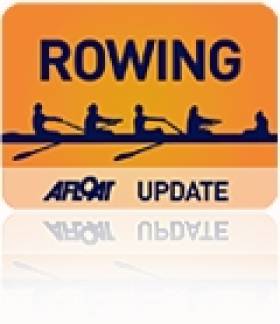Displaying items by tag: Provincial
McCrohan a Record Breaker in Indoor Rowing
#ROWING: Siobhán McCrohan set a new record for Irish lightweight women in indoor competition at the Irish Provinces Indoor Rowing Championships at the University of Limerick. The Tribesmen athlete clocked seven minutes 15.2 seconds for the 2,000 metres. The standing record was 7:16.8, set by Claire Lambe in 2010.
The best men’s open time was 6:10.2, taken by Kevin Coughlan of Carlow, and Jonathan Doyle won the lightweight open section in 6:28.1. There was a record time for 500 metres in the men’s lightweight 50-59 category. Christian Leonard set a time of one minute 34.5 seconds. SELECTED RESULTS
| Mens 2k |
| MO 1 Kevin Coughlan_Carlow 06:10.2 2000 |
| MO 2 David Meehan_SMRC 06:11.3 2000 |
| MO 2 Dan Hindle_NUIG 06:11.3 2000 |
| LMO 1 Jonathan Doyle_PaddyPower_IRC 06:28.1 2000 |
| LMO 2 Alan Mc_Kenna_Carlow 06:38.3 2000 |
| LMO 3 Alan Goodison_Fermoy_RC 06:53.3 2000 |
| Current Irish Record: |
| 2000 19-29 Eamon Joyce M Hwt U.C.C.R.C. 5:59.3 2001 Race result |
| 2000 19-29 Paul Griffin M Lwt Muckross RC 6:16.4 2001 Race result |
| Womens 2k |
| LWO 1 Siobhan McCrohan_Tribesmen_RC L 07:15.2 2000 |
| LWO 2 Amy Bulman_UCCRC 07:48.2 2000 |
| WU23 1 Deirdre O'Sullivan_UCCRC 07:17.9 2000 |
| WU23 2 Caoimhe Joyce-Hearne_NUIG 07:20.4 2000 |
| WU23 3 Hannah O'Sullivan_SMRC 07:23.6 2000 |
| WO 1 Aine Collins_Fermoy_RC 07:23.7 2000 |
| WO 2 Jessica O'Keeffe_SMRC 07:25.4 2000 |
| WO 3 Marie Piggot_NUIG 07:39.4 2000 |
| Current Irish Record: |
| Claire Lambe Lwt UCDBC 7:16.8 2010 Race result |
| Mens 500 |
| New Irish Record : LM50-59 Christian Leonard_ 01:34.5 500 |
| Old Record: LM50-59_500 Joe Keating M Lwt London 1:41.1 2008 Historical Record |





























































